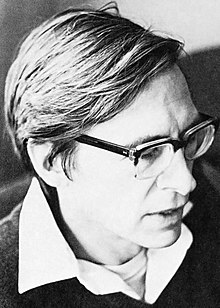John Bordley Rawls (/rɔːlz/;[2] February 21, 1921 – November 24, 2002) was an American moral, legal and political philosopher in the modern liberal tradition.[3][4] Rawls has been described as one of the most influential political philosophers of the 20th century.[5]
In 1990, Will Kymlicka wrote in his introduction to the field that "it is generally accepted that the recent rebirth of normative political philosophy began with the publication of John Rawls's A Theory of Justice in 1971".[6][7] Rawls's theory of "justice as fairness" recommends equal basic liberties, equality of opportunity, and facilitating the maximum benefit to the least advantaged members of society in any case where inequalities may occur. Rawls's argument for these principles of social justice uses a thought experiment called the "original position", in which people deliberately select what kind of society they would choose to live in if they did not know which social position they would personally occupy. In his later work Political Liberalism (1993), Rawls turned to the question of how political power could be made legitimate given reasonable disagreement about the nature of the good life.
Rawls received both the Schock Prize for Logic and Philosophy and the National Humanities Medal in 1999. The latter was presented by President Bill Clinton in recognition of how his works "revived the disciplines of political and ethical philosophy with his argument that a society in which the most fortunate help the least fortunate is not only a moral society but a logical one".[8]
Among contemporary political philosophers, Rawls is frequently cited by the courts of law in the United States and Canada[9] and referred to by practicing politicians in the United States and the United Kingdom. In a 2008 national survey of political theorists, based on 1,086 responses from professors at accredited, four-year colleges and universities in the United States, Rawls was voted first on the list of "Scholars Who Have Had the Greatest Impact on Political Theory in the Past 20 Years".[10]
- ^ Young, Shaun (2002). Beyond Rawls: An Analysis of the Concept of Political Liberalism. Lanham, MD: University Press of America. p. 59. ISBN 978-0761822400.
- ^ "Rawls" entry in Random House Dictionary, Random House, 2013.
- ^ Martin, Douglas (November 26, 2002). "John Rawls, Theorist on Justice, Is Dead at 82 [corrected]". The New York Times. p. C19. Archived from the original on April 11, 2016. Retrieved February 19, 2017.
- ^ Wenar, Leif (2017). "John Rawls". In Zalta, Edward N. (ed.). The Stanford Encyclopedia of Philosophy (Spring 2017 ed.). Metaphysics Research Lab, Stanford University. Archived from the original on April 4, 2019. Retrieved August 22, 2017.
- ^ Williamson, Thad (2012). ""Political Philosophy in the Twentieth Century: Authors and Argument" by Catherine H. Zuckert (Ed.)". Cambridge University Press. Archived from the original on February 24, 2021. Retrieved January 21, 2020.
- ^ Kymlicka, Will (1990). Contemporary political philosophy : an introduction. Oxford [England]: Clarendon Press. pp. 11. ISBN 978-0198277248. OCLC 21762535.
- ^ Swift, Adam (2006). Political philosophy : a beginners' guide for students and politicians (Second edition, revised and expanded ed.). Cambridge: Polity. pp. 10. ISBN 978-0745635323. OCLC 63136336.
- ^ Weinstein, Michael M. (December 1, 2002). "The Nation; Bringing Logic To Bear on Liberal Dogma". The New York Times. ISSN 0362-4331. Archived from the original on June 28, 2023. Retrieved September 7, 2021.
- ^ "Fair Opportunity to Participate". The Canadian Political Science Review. June 2009. Archived from the original on March 28, 2013. Retrieved July 28, 2011.
- ^ Moore, Matthew J. (2009). "Political Theory Today: Results of a National Survey". American Political Science Association 2009 Annual Meeting. Rochester, NY. SSRN 1463648.
